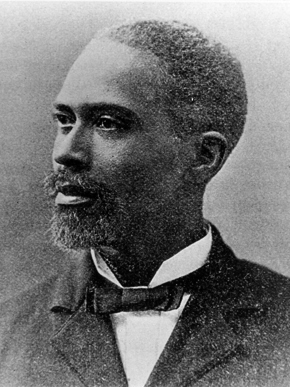William Pettiford: Difference between revisions
Chivon Morse (talk | contribs) mNo edit summary |
No edit summary |
||
| Line 1: | Line 1: | ||
[[Image:William Pettiford.jpg|right|thumb|William Pettiford]] | [[Image:William Pettiford.jpg|right|thumb|William Pettiford]] | ||
'''William Reuben Pettiford''' (born [[January 20]], [[1847]]; died [[1914]]) | '''William Reuben Pettiford''' (born [[January 20]], [[1847]]; died [[September 20]], [[1914]]) was pastor of [[16th Street Baptist Church]] from [[1883]] to [[1893]]. He helped found the [[Alabama Penny Savings Bank]] in October [[1890]], and became its president in [[1899]]. He worked with [[Charles Boothe]] to found the [[Birmingham-Easonian Baptist Bible College|Birmingham Baptist College]] in [[1904]]. | ||
Pettiford enjoyed the respect of many white leaders in Birmingham, even being recommended for appointment to Federal office by his peers. | Pettiford was an active member of the [[Birmingham Negro Business League]] and enjoyed the respect of many white leaders in Birmingham, even being recommended for appointment to Federal office by his peers. He was a friend of educator [[A. H. Parker]] and employed him as a secretary. | ||
He died in September [[1914]]. More than 3,000 people attended his funeral at 16th Street Baptist. Mayor [[George Ward]] and contractor [[Belton Gilreath]] and the [[Birmingham Baptist Association]] provided flowers. He was buried at [[Oak Hill Cemetery]]. His home after his pastorate, known as the [[Pettiford House]], was listed in '''Historic Sites of Jefferson County, Alabama''' compiled by the Jefferson County Historical Commission. | |||
==References== | ==References== | ||
* "Tribute to Memory Noted Negro Pastor" [sic] (September 22, 1914) ''The Nashville Tennessean'', p. 7 | |||
* Harlan, Louis R., Raymond W. Smock, and Barbara S. Kraft, eds. ''The Booker T. Washington Papers.'' Vol. 5: 1899-1900. Campagne, IL: University of Illinois Press. p. 388 | * Harlan, Louis R., Raymond W. Smock, and Barbara S. Kraft, eds. ''The Booker T. Washington Papers.'' Vol. 5: 1899-1900. Campagne, IL: University of Illinois Press. p. 388 | ||
* Satterfield, Carolyn Green (1976) "Historic Sites of Jefferson County, Alabama" Jefferson County Historical Commission | * Satterfield, Carolyn Green (1976) "Historic Sites of Jefferson County, Alabama" Jefferson County Historical Commission | ||
Revision as of 10:44, 15 February 2019
William Reuben Pettiford (born January 20, 1847; died September 20, 1914) was pastor of 16th Street Baptist Church from 1883 to 1893. He helped found the Alabama Penny Savings Bank in October 1890, and became its president in 1899. He worked with Charles Boothe to found the Birmingham Baptist College in 1904.
Pettiford was an active member of the Birmingham Negro Business League and enjoyed the respect of many white leaders in Birmingham, even being recommended for appointment to Federal office by his peers. He was a friend of educator A. H. Parker and employed him as a secretary.
He died in September 1914. More than 3,000 people attended his funeral at 16th Street Baptist. Mayor George Ward and contractor Belton Gilreath and the Birmingham Baptist Association provided flowers. He was buried at Oak Hill Cemetery. His home after his pastorate, known as the Pettiford House, was listed in Historic Sites of Jefferson County, Alabama compiled by the Jefferson County Historical Commission.
References
- "Tribute to Memory Noted Negro Pastor" [sic] (September 22, 1914) The Nashville Tennessean, p. 7
- Harlan, Louis R., Raymond W. Smock, and Barbara S. Kraft, eds. The Booker T. Washington Papers. Vol. 5: 1899-1900. Campagne, IL: University of Illinois Press. p. 388
- Satterfield, Carolyn Green (1976) "Historic Sites of Jefferson County, Alabama" Jefferson County Historical Commission.
